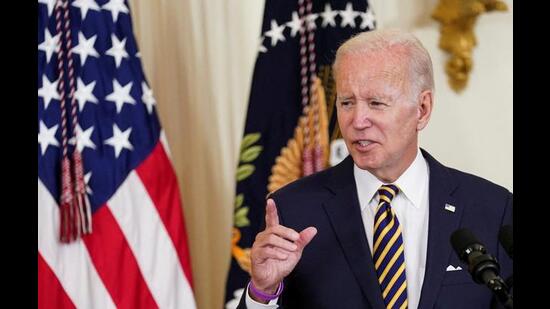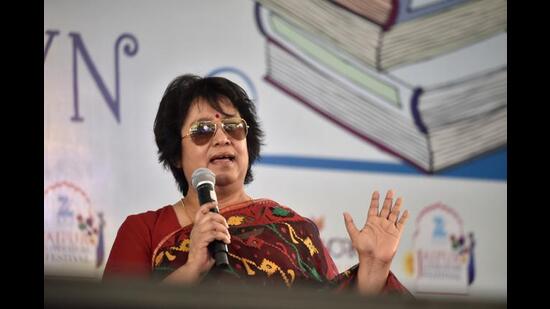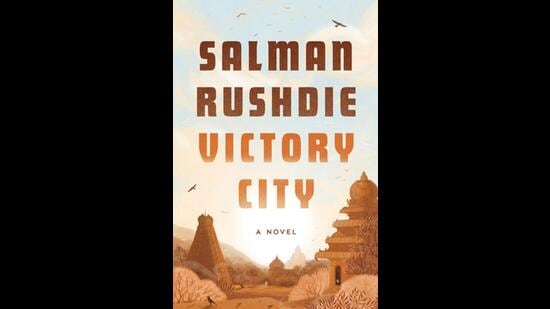Essay: The fallout of the attack on Salman Rushdie
Author Salman Rushdie, who was stabbed multiple times on stage during an event in New York last Friday, has survived the attack – with his defiant sense of humour intact despite his severe injuries, according to a statement released by his son Zafar. The sales of his controversial book published 34 years ago, The Satanic Verses, have skyrocketed globally, and it has raced up Amazon’s best-seller charts. There is renewed interest in his other works, with Midnight’s Children also finding new readers. Best of all, Rushdie has a new novel, Victory City, due for release next year – and it will be coming into a world now keenly awaiting its release.
If the aim of his young assailant Hadi Matar was to silence him, the effect has, quite predictably, been just the opposite. Authors do not live only in flesh and blood; they also live through their works. Attacking them with knives or guns only amplifies their voices.
This, however, is a truth often lost on those whose value systems are mediaeval rather than modern. The deceased Iranian leader Ayatollah Khomeini, who put a fatwa on Rushdie calling for his death, was one such person. His followers and others who hold similarly outdated values have welcomed the stabbing. Naturally, conservatives in Iran were among them. A Right-wing Iranian newspaper, Kayhan, published an article saying “Bravo to this courageous and duty-conscious man who attacked the apostate and depraved Salman Rushdie in New York…Let us kiss the hands of the one who tore the neck of the enemy of God with a knife”.

This was noted by The Timesof Israel, which published an article highlighting the Kayhan piece and noted that the paper’s chief is appointed by Ayatollah Khamenei, the successor of Ayatollah Khomeini. In the US, the Right-leaning media outlet Fox News picked up on the same Kayhan article, along with a couple of similar others, to say “Iranian news outlets celebrated the stabbing of author Salman Rushdie as the hospitalized writer fights for his life”. It also pointed out in a separate, related piece that American Republican Senator Marco Rubio had put out a tweet saying “Iran has offered a bounty to anyone who assassinates Salman Rushdie. Today he was stabbed in America. Why is Biden still negotiating a deal with these terrorists?”

The attack on Rushdie has come at a moment when discussions between USA and Iran on a nuclear deal are at a critical stage. With a war on in Ukraine, there is severe pressure on Europe’s energy security, which is uncomfortably dependent on Russia. Winter is barely three months away and the issue needs to be addressed urgently. On August 8, the European Union, which had been conducting negotiations with the Iranians for the past 15 months, announced that the final text of an agreement to revive the 2015 Iran nuclear deal was ready for signing, and indicated that it could be signed before the end of the month. This is something that Israel, Saudi Arabia, and many of Israel’s supporters in the US in both Republican and Democrat camps have long been eager to prevent. It is also something that hardliners in Iran would like to delay, since it would prevent the country from acquiring the capability to manufacture nuclear weapons. The most significant and immediate fallout of Rushdie’s stabbing is therefore geopolitical. It makes it politically awkward for Biden to sign any nuclear deal with Iran in the immediate future.
In addition, it plays perfectly into the rhetoric of Islamophobic Right-wingers around the world, in countries including India, who are highlighting the statements of Muslim fundamentalists welcoming the attack.
However, they are not the only ones highlighting such statements.

Iranian activist and journalist Masih Alinejad, who lives in America and has also faced death threats from the Iranian regime, is among those who have pointed out celebratory statements by prominent Iranian newspapers and former officials. “In Iran I was told if I criticise Islam I get killed, jailed, lashes, kicked out from Iran. In the West I’m told sharing my story will cause Islamophobia & I get assassinated. Phobia is an irrational fear but my fear of Islamists is rational,” Alinejad wrote on Twitter, adding that “Those who tried to kill Salman Rushdie or attempted to kidnap and assassinate me in New York aiming to kill freedom of expression and impose self-censorship on all of us”.
The attack on Rushdie has brought a flurry of messages to other writers warning them that they would be next. Bangladeshi author Taslima Nasrin, who has forced to flee her country in 1994 after writing a controversial book titled Lajja that had provoked the ire of Muslim fundamentalists, has been flooded with messages on Twitter saying “next number is yours”. Harry Potter creator JK Rowling, who has written no book offensive to Islam, also received a message warning she would be next for merely tweeting she felt sick after hearing about the attack on Rushdie and hoped he would be okay.

Such intolerance is not unique to Muslim fundamentalists, or even to religious fundamentalists in general.
In 2020, Rowling was severely trolled and received death threats after tweeting a link to an article headlined “Creating a more equal post-Covid-19 world for people who menstruate” with the comment “‘People who menstruate’. I’m sure there used to be a word for those people. Someone help me out. Wimben? Wimpund? Woomud?”
This was seen as blasphemy against transsexuals, and attracted the fatwas of the trans community and its champions.

Author Margaret Atwood faced a similar backlash for sharing an article titled “Why Can’t We Say ‘Woman’ Anymore?” Although she was not the writer of that article, her sharing it on social media created a furore and earned her the label of transphobic. After the attack on Rushdie, Atwood wrote in The Guardian that freedom of expression, “once a yawn-making liberal platitude… has now become a hot-button issue, since the extreme right has attempted to kidnap it in the service of libel, lies, and hatred, and the extreme left has tried to toss it out the window in the service of their version of earthly perfection”.
The medieval reaction to blasphemy, in our times as in the past, is not restricted to fanatical worshippers of any one god or dogma. Writers and artists, who live by free expression of thoughts, are being coerced into silence by the ayatollahs of all faiths, religious and secular.
Samrat Choudhury is an author and journalist. His most recent book is The Braided River: A Journey Along the Brahmaputra
The views expressed are personal
This Independence Day, get Flat 50% Off on Annual Subscription Plans
Enjoy Unlimited Digital Access with HT Premium
Author Salman Rushdie, who was stabbed multiple times on stage during an event in New York last Friday, has survived the attack – with his defiant sense of humour intact despite his severe injuries, according to a statement released by his son Zafar. The sales of his controversial book published 34 years ago, The Satanic Verses, have skyrocketed globally, and it has raced up Amazon’s best-seller charts. There is renewed interest in his other works, with Midnight’s Children also finding new readers. Best of all, Rushdie has a new novel, Victory City, due for release next year – and it will be coming into a world now keenly awaiting its release.

If the aim of his young assailant Hadi Matar was to silence him, the effect has, quite predictably, been just the opposite. Authors do not live only in flesh and blood; they also live through their works. Attacking them with knives or guns only amplifies their voices.
This, however, is a truth often lost on those whose value systems are mediaeval rather than modern. The deceased Iranian leader Ayatollah Khomeini, who put a fatwa on Rushdie calling for his death, was one such person. His followers and others who hold similarly outdated values have welcomed the stabbing. Naturally, conservatives in Iran were among them. A Right-wing Iranian newspaper, Kayhan, published an article saying “Bravo to this courageous and duty-conscious man who attacked the apostate and depraved Salman Rushdie in New York…Let us kiss the hands of the one who tore the neck of the enemy of God with a knife”.

This was noted by The Timesof Israel, which published an article highlighting the Kayhan piece and noted that the paper’s chief is appointed by Ayatollah Khamenei, the successor of Ayatollah Khomeini. In the US, the Right-leaning media outlet Fox News picked up on the same Kayhan article, along with a couple of similar others, to say “Iranian news outlets celebrated the stabbing of author Salman Rushdie as the hospitalized writer fights for his life”. It also pointed out in a separate, related piece that American Republican Senator Marco Rubio had put out a tweet saying “Iran has offered a bounty to anyone who assassinates Salman Rushdie. Today he was stabbed in America. Why is Biden still negotiating a deal with these terrorists?”

The attack on Rushdie has come at a moment when discussions between USA and Iran on a nuclear deal are at a critical stage. With a war on in Ukraine, there is severe pressure on Europe’s energy security, which is uncomfortably dependent on Russia. Winter is barely three months away and the issue needs to be addressed urgently. On August 8, the European Union, which had been conducting negotiations with the Iranians for the past 15 months, announced that the final text of an agreement to revive the 2015 Iran nuclear deal was ready for signing, and indicated that it could be signed before the end of the month. This is something that Israel, Saudi Arabia, and many of Israel’s supporters in the US in both Republican and Democrat camps have long been eager to prevent. It is also something that hardliners in Iran would like to delay, since it would prevent the country from acquiring the capability to manufacture nuclear weapons. The most significant and immediate fallout of Rushdie’s stabbing is therefore geopolitical. It makes it politically awkward for Biden to sign any nuclear deal with Iran in the immediate future.
In addition, it plays perfectly into the rhetoric of Islamophobic Right-wingers around the world, in countries including India, who are highlighting the statements of Muslim fundamentalists welcoming the attack.
However, they are not the only ones highlighting such statements.

Iranian activist and journalist Masih Alinejad, who lives in America and has also faced death threats from the Iranian regime, is among those who have pointed out celebratory statements by prominent Iranian newspapers and former officials. “In Iran I was told if I criticise Islam I get killed, jailed, lashes, kicked out from Iran. In the West I’m told sharing my story will cause Islamophobia & I get assassinated. Phobia is an irrational fear but my fear of Islamists is rational,” Alinejad wrote on Twitter, adding that “Those who tried to kill Salman Rushdie or attempted to kidnap and assassinate me in New York aiming to kill freedom of expression and impose self-censorship on all of us”.
The attack on Rushdie has brought a flurry of messages to other writers warning them that they would be next. Bangladeshi author Taslima Nasrin, who has forced to flee her country in 1994 after writing a controversial book titled Lajja that had provoked the ire of Muslim fundamentalists, has been flooded with messages on Twitter saying “next number is yours”. Harry Potter creator JK Rowling, who has written no book offensive to Islam, also received a message warning she would be next for merely tweeting she felt sick after hearing about the attack on Rushdie and hoped he would be okay.

Such intolerance is not unique to Muslim fundamentalists, or even to religious fundamentalists in general.
In 2020, Rowling was severely trolled and received death threats after tweeting a link to an article headlined “Creating a more equal post-Covid-19 world for people who menstruate” with the comment “‘People who menstruate’. I’m sure there used to be a word for those people. Someone help me out. Wimben? Wimpund? Woomud?”
This was seen as blasphemy against transsexuals, and attracted the fatwas of the trans community and its champions.

Author Margaret Atwood faced a similar backlash for sharing an article titled “Why Can’t We Say ‘Woman’ Anymore?” Although she was not the writer of that article, her sharing it on social media created a furore and earned her the label of transphobic. After the attack on Rushdie, Atwood wrote in The Guardian that freedom of expression, “once a yawn-making liberal platitude… has now become a hot-button issue, since the extreme right has attempted to kidnap it in the service of libel, lies, and hatred, and the extreme left has tried to toss it out the window in the service of their version of earthly perfection”.
The medieval reaction to blasphemy, in our times as in the past, is not restricted to fanatical worshippers of any one god or dogma. Writers and artists, who live by free expression of thoughts, are being coerced into silence by the ayatollahs of all faiths, religious and secular.
Samrat Choudhury is an author and journalist. His most recent book is The Braided River: A Journey Along the Brahmaputra
The views expressed are personal
This Independence Day, get Flat 50% Off on Annual Subscription Plans
Enjoy Unlimited Digital Access with HT Premium
